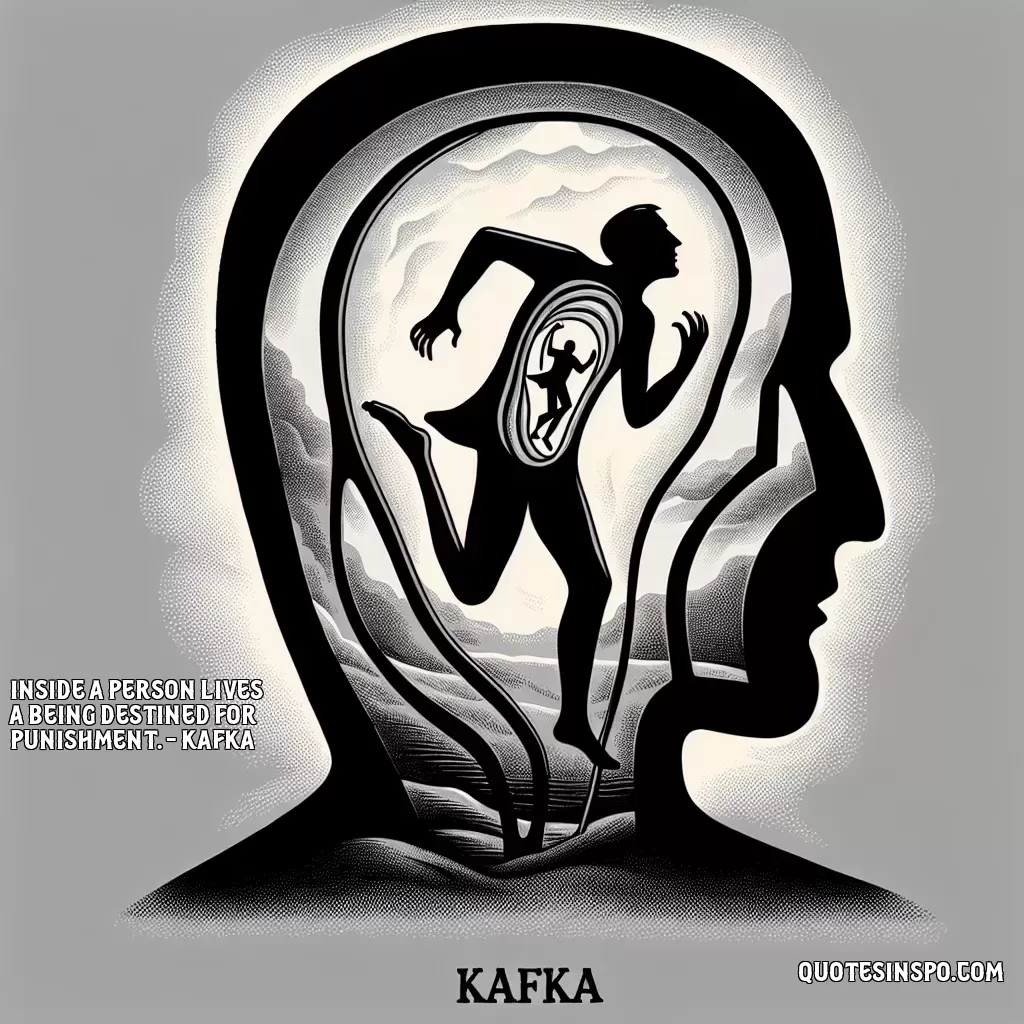
Inside a person lives a being destined for punishment. - Kafka
Franz Kafka, known for his exploration of existential themes and the human condition, often delved into the darker aspects of human nature and the plight of the individual within society. The quote, "Inside a person lives a being destined for punishment," encapsulates Kafka's recurring motifs of guilt, alienation, and the inevitability of suffering. At the heart of this quote is the notion of an inherent sense of guilt and culpability residing within each individual. Kafka suggests that there is a part of every person that feels inherently flawed or guilty, as if destined for punishment. This internal being can be seen as a reflection of the existential angst and pressure exerted by societal norms and expectations. It may represent the moral and ethical dilemmas that individuals grapple with, and the sense of inadequacy and failure that can arise from the impossibility of living up to ideal standards. Furthermore, the idea of being "destined for punishment" hints at the perceived inevitability of suffering in the human condition. It suggests a deterministic view where individuals, despite their efforts, cannot escape their internal condemnations and the consequences that arise from them. This speaks to a broader theme in Kafka's work—the futility of human effort against the overwhelming and often incomprehensible forces of life, represented by bureaucracy in "The Trial" or familial duty in "The Metamorphosis." Kafka’s reflection is also a critique of the human psyche, which often internally judges and criticizes itself with harsh severity. The quote encourages introspection, urging individuals to confront these internalized judgments and acknowledge the shadowy parts of their consciousness that society may have implanted. In doing so, Kafka illuminates the struggle for authenticity and acceptance despite the inevitable imperfections of the self. This dense, thought-provoking perspective challenges readers to consider how much of their punitive self-view is internally generated and how much is imposed by external forces.
Quote By: Kafka
Franz Kafka, born on July 3, 1883, in Prague, was a German-speaking Bohemian writer who is widely regarded as one of the most significant figures in 20th-century literature. His work, characterized by surreal and existential themes, reflects his profound sense of alienation and anxiety, stemming from his unique position in a society characterized by rapid change and uncertainty. Kafka was the eldest of six children in a middle-class Jewish family, and his complex relationship with his authoritarian father deeply influenced his writing and worldview.
Kafka pursued a law degree at the German University in Prague, graduating in 1906. He eventually worked as a clerk at the Workers Accident Insurance Institute, a job that provided him with a stable income but left him unsatisfied and longing for creative fulfillment. Despite his professional obligations, Kafka devoted a significant portion of his time to writing, producing a body of work that would later be recognized for its innovative narrative techniques and profound philosophical inquiries.
Among Franz Kafka’s most famous works are "The Metamorphosis," "The Trial," and "The Castle." "The Metamorphosis," published in 1915, tells the surreal story of Gregor Samsa, a man who wakes up one morning transformed into a gigantic insect. This short story encapsulates Kafka's themes of alienation and the absurdity of life, serving as a powerful allegory for the human condition. Similarly, "The Trial," published posthumously in 1925, explores the bewildering and often nightmarish experiences of Josef K., a man who is arrested and prosecuted by a mysterious authority without ever knowing the nature of his crime.
Franz Kafka’s literary legacy has left an indelible mark on modern literature, influencing countless writers and artists. His work challenges readers to confront the complexities of existence and the often incomprehensible nature of bureaucratic power. Kafka's unique voice, characterized by clarity and ambiguity, continues to resonate with contemporary audiences, making him a pivotal figure in the exploration of existential themes. Despite his relatively modest output and the fact that most of his works were published posthumously, Franz Kafka's impact on literature and thought remains profound and enduring. He died on June 3, 1924, in Kierling, Austria, leaving behind a rich tapestry of literary creations that continue to inspire and provoke thought.